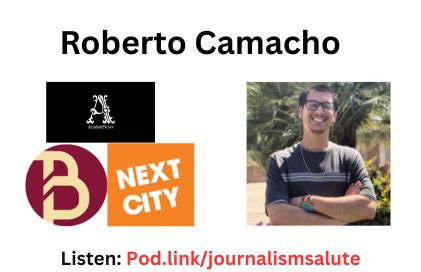New episode: Roberto Camacho Centers Those Who Are Closest To The Harm
A freelance journalist immerses in his San Diego community
San Diego-based freelance journalist Roberto Camacho says that he's never short of story ideas, which is fortunate for him but an unfortunate reality for the communities he most often covers. His stories often focus on the difficulties San Diego's immigrant communities face on a daily basis whether from threats of things such as ICE or from pollution.
" The process for me whenever I approach any story is that I always look at who's the closest to the harm that's being done or being affected by a particular issue that I'm reporting on," Camacho said in this week's interview with Mark Simon on The Journalism Salute.
"I think as journalists, it's our duty to show the full picture and to give nuance. That's the biggest thing that we're missing right now in this 24-hour digital age of tweets and Instagram posts and TikTok. Everybody wants to condense everything down to a 160-character tweet or 15-second video. You can't do that with journalism. You don't get nuanced or in-depth with that kind of format."
Roberto has built a relationship with different communities and community groups in San Diego such that he can get invited on a ride along with a neighborhood patrol that is looking for ICE's presence in the city or get local residents whose lives were impacted by pollution impacting select neighborhoods in the city to share their story.
"The hardest part is building the trust between communities that have historically not had the best interaction with the press because they have not been treated fairly … whether that is biased coverage or journalists who just parachute in and then just leave as soon as the story (runs).
"This is not something that I just did overnight. I've been freelancing now for almost the better part of 10 years at this point. It requires showing your face even on something that's not necessarily reporting. It's the most difficult part, not in the sense that it's difficult to do, because it requires patience and takes time.
"A lot of the people I speak with, I keep in contact with them because there might be something else that happens in the community that happens later on and the story comes back to them."
This has been a frequent theme on this podcast. If you're a community-oriented journalist, you have to immerse within your community. It applies to just about any area of coverage. You need to be a dedicated journalist.
Hope you'll listen to this episode, Roberto shared stories of the work he's done on these topics as well as one that's his fun area – hip-hop music.
And if you like this episode, I recommend listening to our conversation from 2023 with then-Philadelphia Inquirer reporter Massarah Mikati who shared her experience doing similar work.




